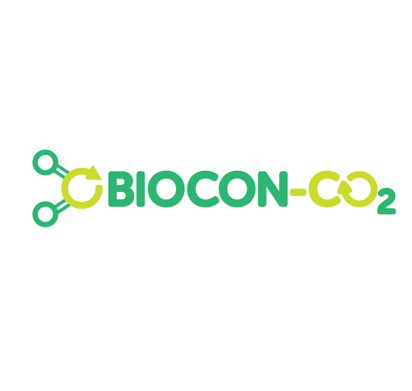BIOtechnological processes based on microbial platforms for the CONversion of CO2 from iron&steel industry into commodities for chemicals and plastics
The main objective of BIOCON-CO2 is to develop and validate in an industrially relevant environment a flexible platform to biologically transform CO2 into added-value chemicals and plastics. The versatility and flexibility of the platform, based on 3 main stages (CO2 solubilization, bioprocess and downstream) will be proved by developing several technologies and strategies for each stage that will be combined as puzzle pieces.
BIOCON-CO2 will develop 4 Microbial Cell Factories (MCFs) based on low-energy biotechnological processes using CO2 from iron&steel industry as a direct feedstock to produce 4 commodities with application in chemicals and plastics sectors using 3 different biological systems.
- Microbial Cell Factory 1: Clostridium fermentative process to C3-C6 alcohols = Branched alcohols for the chemical industry
- Microbial Cell Factory 2: Acetobacter fermentative process to 3-hydroxypropionic acid production = Biopolymers and acrylic derivatives for the chemical industry
- Microbial Cell factory 3: Format dehydrogenase improvement and exploitation in a synthetic microbial system to formic acid production by biocatalytic process = Feed additives for the food/feed industry
- Microbial Cell factory 4: One-pot multi-enzyme route system for lactic acid production by a novel biocatalytic process = Feed additives and Biopolymers
The technologic, socio-economic and environmental feasibility of the processes will be assessed to ensure their future industrial implementation, replicability and transfer to other CO2 sources, such as gas streams from cement and electricity generation industries.
BIOCON-CO2 will overcome the current challenges of the industrial scale implementation of the biotechnologies routes for CO2 reuse by:
- developing engineered enzymes
- immobilization in nanomaterials
- genetic and metabolic approaches
- strain acclimatization
- engineered carbonic anhydrases
- pressurized fermentation
- trickle bed reactor using advanced materials and electro-fermentation.
The project aims to capture at least 4% of the total market share at medium term (1.4Mtonnes CO2/year) and 10% at long-term (3.5Mtonnes CO2/year) contributing to reduce EU dependency from fuel oils and support the EU leadership in CO2 reuse technologies.
Policy recommendations and public perception and acceptance will be explored and a commercialization strategy will be executed by a detailed exploitation plan and technology transfer.
ACTIVITIES of Bio Base Europe Pilot Plant
- Development of a mobile gas fermentation pilot unit to be used on site of industrial emitters
- Evaluation of gas utilizing microbial strains on lab and pilot scale
- Demonstration of the development processes in the real industrial environment
PARTNERS
- ACONDICIONAMIENTO TARRASENSE ASSOCIACION (LEITAT), ES (COORDINATOR)
- ArcelorMittal Belgium NV, BE
- Arkema France, FR
- Fraunhofer Gesellschaft zur Förderung der Angewandten Forschung, E.V., DE
- National Technical University of Athens – NTUA, GR
- Pervatech BV, NL
- Rheinisch-Westfälische Technische Hochschule Aachen (RWTH), DE
- Wageningen Research – WUR, NL
- ARTTIC, FR
- AquaTT Ltd., IE
- Nutrition Sciences NV, BE
- Nesher Israel Cement Enterprises Ltd., IL
- Universitat Autonoma de Barcelona, ES
- AES Gener SA, CL
- Bio Base Europe Pilot Plant, BE
- Rijksuniversiteit Groningen, NL
- Fundacion TECNALIA Research and Innovation, ES
- Covestro Deutschland AG, DE
SUPPORTED by



 webdesign
webdesign